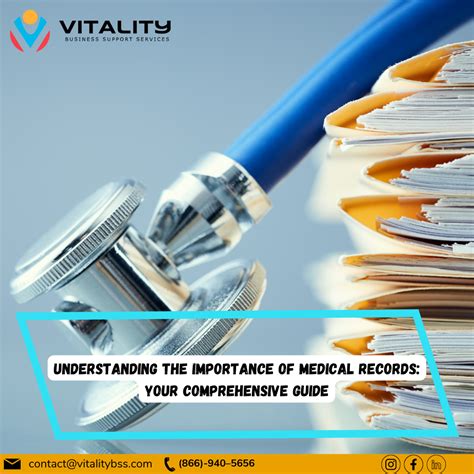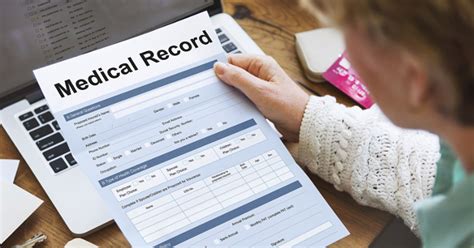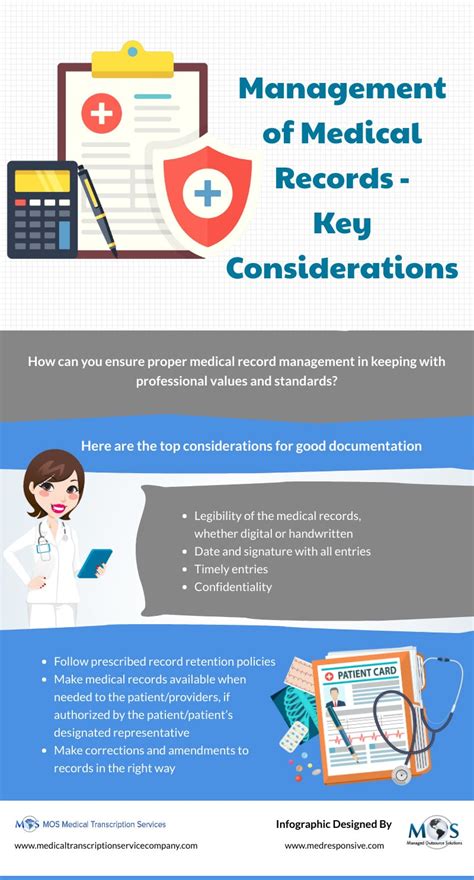Intro
Access your medical history effortlessly with our guide to finding medical records, including electronic health records, patient portals, and medical record requests, making it easy to manage your healthcare and medical information securely.
Finding your medical records can be a daunting task, especially when you need them urgently. Medical records are a crucial aspect of your healthcare, as they contain vital information about your medical history, diagnoses, treatments, and test results. Having easy access to your medical records can help you make informed decisions about your health, ensure continuity of care, and even prevent medical errors. In this article, we will explore the importance of medical records, the challenges of accessing them, and provide you with practical tips on how to find your medical records easily.
The importance of medical records cannot be overstated. They provide a comprehensive picture of your health, including your medical conditions, allergies, medications, and test results. Medical records are used by healthcare providers to diagnose and treat your conditions, and they are also essential for research, quality improvement, and public health purposes. Moreover, medical records can be used to identify trends and patterns in your health, which can help you and your healthcare providers make informed decisions about your care.
In the past, medical records were typically stored in paper files, which made them difficult to access and manage. However, with the advent of electronic health records (EHRs), medical records are now digitized and can be easily accessed and shared between healthcare providers. EHRs have improved the efficiency and accuracy of medical record-keeping, and they have also enabled patients to take a more active role in managing their health. Despite these advances, many people still struggle to access their medical records, which can be frustrating and even harmful to their health.
Understanding Your Medical Records

Types of Medical Records
There are several types of medical records, including inpatient records, outpatient records, and personal health records. Inpatient records are created when you are admitted to a hospital or other healthcare facility, and they contain information about your diagnosis, treatment, and hospital stay. Outpatient records are created when you visit a healthcare provider's office or clinic, and they contain information about your diagnosis, treatment, and follow-up care. Personal health records are maintained by you, the patient, and they contain information about your medical history, allergies, medications, and test results.Benefits of Accessing Your Medical Records

How to Access Your Medical Records
To access your medical records, you can start by contacting your healthcare provider's office or medical records department. They can provide you with information about their medical records policies and procedures, including how to request access to your records. You can also use online patient portals, which are secure websites that allow you to access your medical records, communicate with your healthcare providers, and manage your care. Additionally, you can use mobile apps, which can help you track your health, access your medical records, and communicate with your healthcare providers.Challenges of Accessing Medical Records

Overcoming the Challenges
To overcome the challenges of accessing medical records, healthcare providers and patients can work together to improve the quality and accessibility of medical records. Healthcare providers can implement standardized medical records systems, which can facilitate the sharing of records between providers. Patients can also take an active role in managing their medical records, by reviewing their records regularly, identifying errors or inaccuracies, and communicating with their healthcare providers. Moreover, patients can use online patient portals and mobile apps to access their medical records, communicate with their healthcare providers, and manage their care.Best Practices for Managing Medical Records

Secure Storage and Sharing of Medical Records
To ensure the security and integrity of your medical records, it's essential to use secure methods to store and share your records. You can use encrypted files, secure email, or online patient portals to share your records with your healthcare providers. You should also use strong passwords, keep your software up-to-date, and use two-factor authentication to protect your records from unauthorized access. Moreover, you can use secure methods to store your records, such as external hard drives or cloud storage, which can provide an additional layer of security and protection.Conclusion and Next Steps

What are medical records, and why are they important?
+Medical records are documents that contain information about your medical history, diagnoses, treatments, and test results. They are essential for your healthcare, as they provide a comprehensive picture of your health and help healthcare providers diagnose and treat your conditions.
How can I access my medical records?
+You can access your medical records by contacting your healthcare provider's office or medical records department, using online patient portals, or mobile apps. You can also request a copy of your records, which can be provided to you in paper or electronic format.
What are the benefits of accessing my medical records?
+Accessing your medical records can have numerous benefits, including improved health outcomes, enhanced patient engagement, and better care coordination. You can use your medical records to track your health, identify trends and patterns, and make informed decisions about your care.
We hope that this article has provided you with valuable information and insights on how to find your medical records easily. If you have any further questions or comments, please don't hesitate to share them with us. You can also share this article with your friends and family, or bookmark it for future reference. Remember to take an active role in managing your medical records, and don't hesitate to reach out to your healthcare providers if you have any questions or concerns. By working together, we can ensure that you receive high-quality care and achieve the best possible health outcomes.
